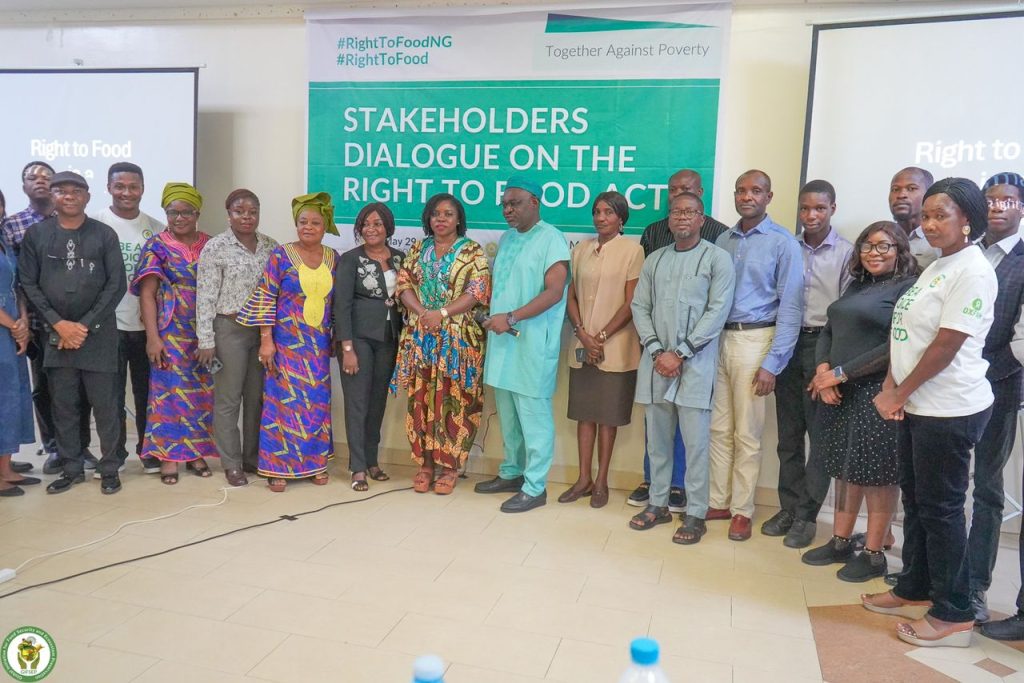
The Lagos State Commissioner for agriculture, Abisola Olusanya, in group photograph with the participants on 29 May
By allcitynews.ng
Critical stakeholders have advocated inclusion of agricultural, entrepreneurial, skills in School Curriculum as short and long time solutions to curb food scarcity across the country.
They citing the case of country like India where food stuff is the cheapest commodity as result of increased involvement of most people in agriculture as reason for their call, they reiterated their call on federal government to include agricultural skills in secondary schools in order to catch them young and curb unemployment in the country.
The participants in “Rights to food”, workshop organized by the Global Initiative for Food Security and Ecosystem Preservation (GIFSEP) in collaboration with OXFAM and other civil society organizations, which took place on Thursday 29 May 2025 in Whitehouse Msquare Hotel, Toyin Street, Ikeja Lagos, Nigeria, agreed that inclusion of more vibrant hands in agriculture would be a short and long time solutions to tackle hunger and food insecurity across the country.
They noted that catching them young by introducing the young ones into agriculture would bring lasting solution towards tackling food insufficiency.
And the Lagos State Government Commissioner for agriculture, Abisola Olusanya on her part described food security as pivotal roles that need more collaboration with critical stakeholders in line with vision of Governor, Babajide Sanwo-Olu and his team.
Olusanya said this at the just concluded “Right to Food workshop which took place at Toyin Street, Ikeja Lagos on Thursday enumerating numerous steps taken by the Governor, Babajide Sanwo-Olu and his team towards addressing the food insecurity, said “tackle high cost of food insecurity and checkmate after harvest spoilage of farm products needs the input of private sectors to fast track the plan of food provision.
The commissioner who was represented by the Lagos State Coordinator, Agro-Processing, Productivity, Enhancement and Livelihood Improvement Support, Ranti Sagoe-Oviebo, noted that the call by participants in the programme for government accountability cannot be achieved without discipline of individuality.
According to Sagoe-Oviebo, “indiscipline individuals cannot make implementation implementation of government policy towards food sufficiency reality.
“Is it government that is making most people to adulterated food and drinks or unjustifiable hike of prices of food? At least Sanwo-Olu has tried towards eliminating middlemen from farm produce in order to reduce cost of farm products products.”
Delivering the keynote address, Dr Michael David, Executive Director of GIFSEP, described the Right to Food Act—passed in 2023—as a landmark in Nigeria’s legislative journey which should yeild positive impact if it is fully implemented.
Dr David, emphasising that without implementation of right to food the expected transformative potential would remain unrealized, called on all for full and effectively implementation.
“Today, we must reaffirm our commitment to turning policy into action, holding relevant authorities accountable, and ensuring that every Nigerian has access to food as a basic human right.”
The GIFSEP boss applauded the Lagos State Government for its proactive agricultural initiatives, noting that the state had set a commendable example by supporting farmers and ensuring improved access to food.
“Food security has eluded Nigeria since independence, and this is largely due to the failure to enforce the Right to Food Act. The right to food is fundamentally the freedom from hunger,” he added.
And in his remarks, the Country Director of OXFAM, John Makina, also commended Lagos State for its agricultural development efforts. He stressed that despite Nigeria’s vast natural and human resources, millions continue to suffer from food insecurity and malnutrition.
“Food is a basic necessity of life. Yet, according to the Food and Agriculture Organization (FAO), over 20 million Nigerians are severely food insecure,” Makina stated.
“Between 2020 and 2022, more than 21% of Nigeria’s population experienced hunger, with many going entire days without food due to poverty and lack of access.”
Adding a grassroots perspective, Mrs. Joy Onime, who represented The Ogbonge Women, a female-led social advocacy group, emphasized the challenges faced by small-scale women farmers.
She urged the government to improve access to financing and resources for rural and peri-urban farmers.
“Nigeria is blessed with arable land, but the lack of adequate support is pushing many out of farming. Everyone must be encouraged to embrace agriculture if we are truly serious about feeding our population,” she said.
Do you wish to ADVERTISE Your Brand Or Need Event Coverage?
Or Have Breaking story with pictorial evidence? Or wants to assist us by DONATIONS?
kindly contact us via 09159744240/allcitynews86@gmail.com
Goal of allcitynews.ng/allcitynews.blog:-
To interface between policy makers & general public, be most influential, informative and reliable issues-based online newspaper.
Disclaimer:
Comments expressed here do not in anyway reflect the opinions of allcitynews.ng or any employee thereof.












More Stories
No fixed date yet for the hearing of suit by Barrister challenging WAEC over midnight examination
Why judiciary workers set to embark on nationwide strike, June 2
Just in: Federal Government pledges monthly payment of N45,000 for each student in technical colleges across the country